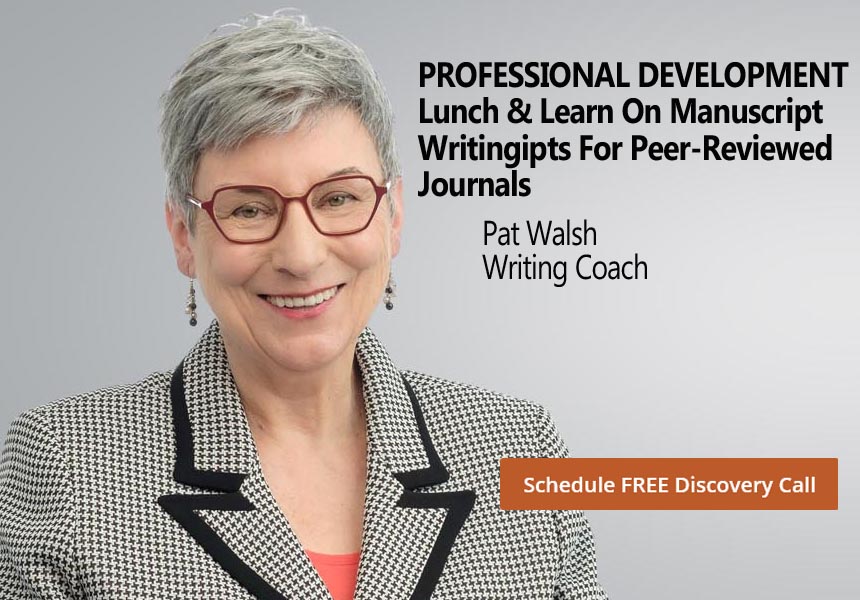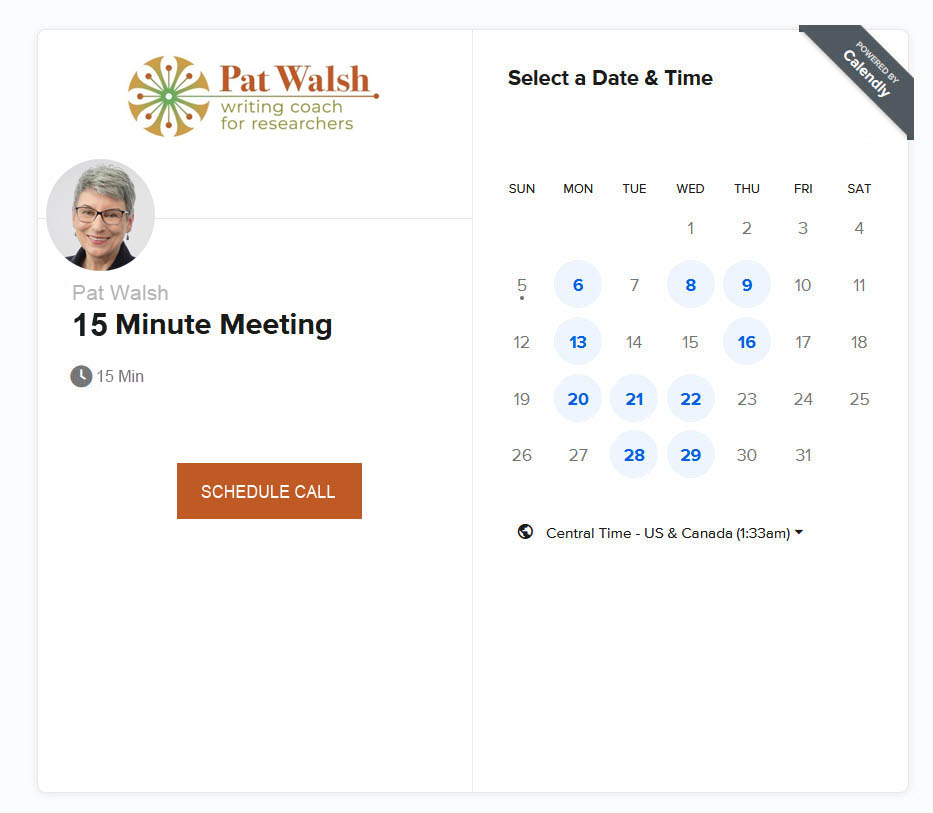PROFESSIONAL DEVELOPMENT
Lunch & Learns
Are you responsible for finding a speaker for a Lunch & Learn?
I’m available! Choose from my menu of a dozen topics.
Book my Lunch & Learn to get your team fired up about publishing!
Menu of Lunch & Learns
Presenter: Pat Walsh
Format: Delivered remotely via Zoom; 1 hour (40-minute presentation and 20-minute Q & A)
1. Take a deep dive into scientific publication. To inform their efforts to publish, researchers and those who support them need to understand the priorities of scientific journals, the process of peer review, and the range of editorial decisions made on paper submissions.
- Participants in this Lunch & Learn will learn about the peer review process in scientific publications. They will increase their understanding of the information researchers use to select a target journal, strategies to tailor a paper to the mission and audience of the journal, and options for responding to reviewer feedback and editorial decisions.
- Anatomy of a scientific paper. Authors need to fully understand their target journal’s expectations for each component of a scientific paper.
- Participants in this Lunch & Learn will learn about the purpose and structure of each component of a scientific paper: title, abstract, keywords, introduction, methodology, results, discussion, implications, recommendations, limitations, and conclusion. They will increase their understanding of the instructions that the AMA and APA manuals of style provide for writing these components. Participants will also become more aware of typical criticisms journal editors and peer reviewers make of these components in submitted manuscripts.
- Professional writing strategies. Professional writers develop a practical approach to increase their productivity. Fortunately, the same strategies that speed up the writing process also improve quality.
- Participants in this Lunch & Learn will learn how to systematize their writing preparation, use exemplars, and optimize successive drafts. They will become familiar with readily available—yet often overlooked—resources to help them build their capacity as scientific writers.
- Professional editing and proofreading techniques. Professional writers establish editing routines that help them efficiently turn rough drafts into a polished final product.
- Participants in this Lunch & Learn will learn about the methods and benefits of collaborative editing. They will increase their awareness of the many guidelines in the AMA and APA manuals of style that should inform the editing of scientific manuscripts. Participants will also become familiar with professional proofreading techniques and tools.
- Leverage prior writing into scientific papers. There is no need to stare at a blank page when writing a scientific paper when there are already documents that can serve as a starting point.
- Participants in this Lunch & Learn will increase their awareness of how to pull from the argument and description in the grant proposal and IRB application when developing a manuscript. They will learn practical tips on building the foundation for a manuscript from conference posters or presentations. Participants will also get advice on how to turn academic writing, such as a Master’s thesis or PhD dissertation, into scientific papers for publication.
- Feedback/revision. Instead of clicking “accept all changes,” let feedback inspire a deeper revision and drive your acquisition of stronger writing skills. Learning from the input of critical readers is the fast track to writing improvement.
- Participants in this Lunch & Learn will learn strategies for eliciting specific feedback, reconciling conflicting feedback, and skillfully responding to challenging feedback. They will also become familiar with techniques for giving constructive and motivating feedback to others on their writing.
- Overcome writing obstacles. What is holding you back from becoming the productive and successful scientific writer you aspire to be?
- Participants in this Lunch & Learn will learn how to break the perfectionism/procrastination cycle, set boundaries to avoid endless literature review, and plan a drafting process that facilitates meeting deadlines. Participants will also increase their awareness of writing habits that will support continuous improvement.
- Why should I establish a writing practice? A consistent, sustainable writing practice will support your long-term career growth.
- Participants of this Lunch & Learn will learn strategies for planning the writing workflow, accurately estimating the scope and time requirements for each part of a writing project, and setting a sustainable pace through structured writing sessions. They will become familiar with a framework for systematically carving out time for writing responsibilities—despite competing demands on time and energy. Participants will become aware of how a personalized writing practice tailored to their needs, abilities, and preferences will increase their productivity and reduce deadline stress.
- Tips on how to write a plain language summary To build trust and support for the research enterprise, it has become increasingly important to communicate the value of your work to the public. Research institutes are committed to offering the public accessible descriptions of advances in science that promote health. Many funders have made lay abstracts of research a required deliverable from grantees.
- Participants in this Lunch & Learn will learn about the components of a plain language summary. They will increase their awareness of the challenges of conveying complex information to audiences with limited backgrounds in science. Participants will gain knowledge of strategies for framing the components of plain language summaries to appeal to a general audience.
- Narrative components of a grant proposal. Each section of the narrative in a grant proposal plays a vital role in making a compelling case for the research project.
- Participants in this Lunch & Learn will increase their understanding of the purpose and structure of each narrative component of a grant proposal: Specific Aims, Significance, Innovation, and Approach. They will expand their knowledge of how these sections work together to communicate the value of the proposed work and become familiar with the evaluation process for assessing the merit of a grant application. Participants will learn the similarities and differences between the narrative requirements for grant proposals to private foundations and those to federal funders. They will also become familiar with typical criticisms that grant reviewers make regarding the narrative components of a proposal.
- Generative AI and scientific publications. There is a growing understanding of the potential impact of generative AI on scholarship. Journals now require authors to disclose any use of generative AI in submitted manuscripts. The presenter of this Lunch & Learn has 30 years of experience as a writing coach for researchers. She will share her observations on how relying on generative AI influences the attention, reflection, and meaning-making ability of several of her clients who are experimenting with this tool.
- The participants in this Lunch & Learn will deepen their understanding of the implications for researchers using generative AI in their scientific writing. They will also become aware of the important issues raised by the Committee on Publication Ethics (COPE) regarding the use of AI tools in peer review and the potential impact on journals and the scholarly record.
- Mentoring students and early career researchers in writing. As you advance in your research career, mentoring students and junior colleagues becomes a rewarding—yet time consuming—responsibility. With the loss of funding to pipeline programs, personally mentoring individuals to become the next generation of scientists has become vitally important to sustaining the scientific enterprise. The trick is to do so efficiently so as not to compromise the writing time you need to publish your own work.
- The participants in this Lunch & Learn will become familiar with collaborative editing strategies that will rapidly increase skill building in mentees The power and efficiency of employing peer review before mentor review will also be discussed. To conserve their limited time for draft review, participants will learn strategies to guide mentees in using proofreading/editing and AI tools effectively. Participants will also learn ways to set realistic expectations and time-saving boundaries with mentees when reviewing and revising their work.
Your group can ask me anything about manuscript writing in this informal question and answer session. I will share my insights from nearly 30 years of coaching researchers on writing manuscripts for peer-reviewed journals.
I have presented lively Lunch & Learns for research teams, departments, post-doctoral fellows, graduate students, and professional organizations.
Benefits:
• Foster dialogue on manuscript productivity among your group
• Provide strategies to speed up the writing process and elevate quality
• Encourage novices to seek professional development opportunities
• Reveal opportunities to support your group in manuscript writing
Lunch and Learn Details:
- The Lunch & Learn is conducted remotely in real time over Zoom.
- I create an informal and safe space to ask questions.
- All participants are engaged, whether your group assembles in-person, online, or in a hybrid format.
- Fee: $500 stipend for 1-hour Lunch & Learn
Let’s talk about your need for a speaker.
Typical questions that people ask me during a Lunch & Learn
“How do I motivate myself to continue after my manuscript has been rejected?”
“How do I respond to conflicting feedback from reviewers?”
“What are the differences between grant writing and manuscript writing?”
“What are strategies for leveraging my dissertation into publishable manuscripts?”
“How do I get my coauthors to give me meaningful feedback?”
“Will AI-assisted writing (e.g., ChatGPT) help or hinder me in manuscript writing?”
“How do I find the time to write?”
“How do I pick the right journal?”
“In what order should I draft sections of the manuscript?”
“How do I stop procrastinating?”
“How do I keep from going over the word count?”
“How can I frame research data that is aging?”
“How can I improve my acceptance rate?”


